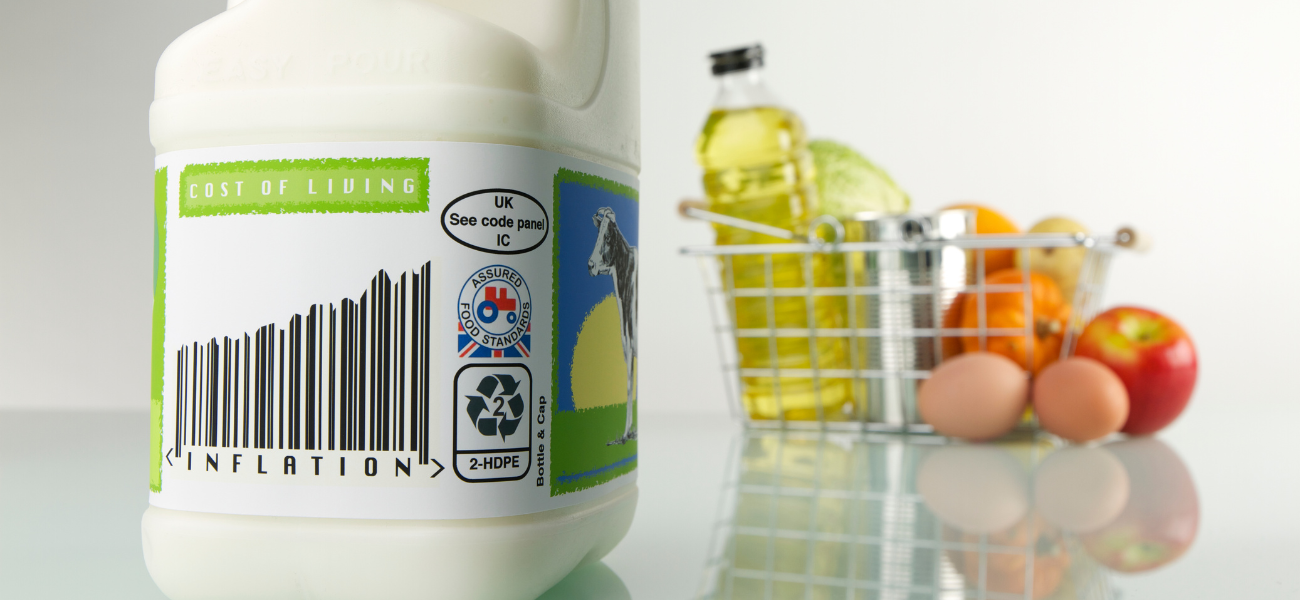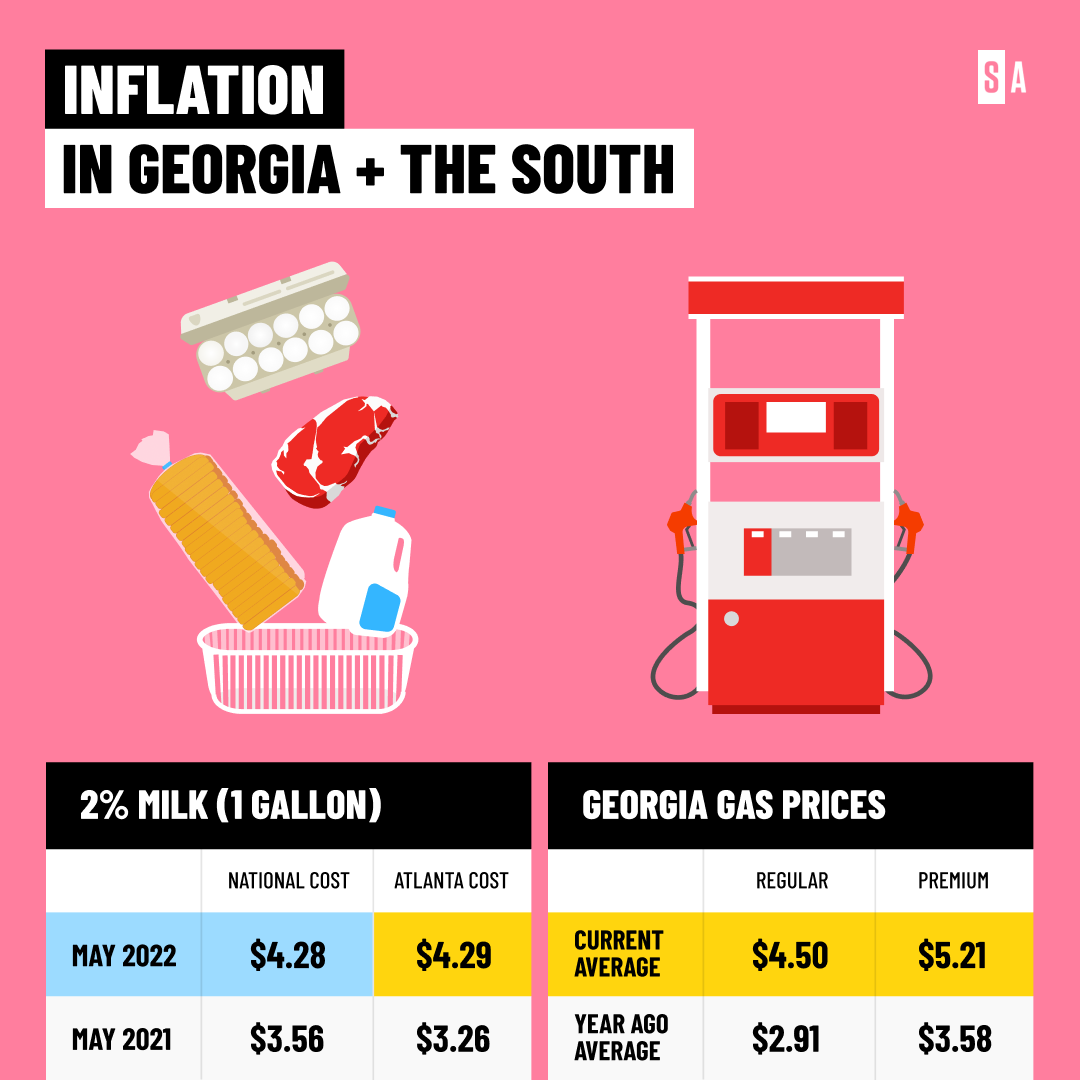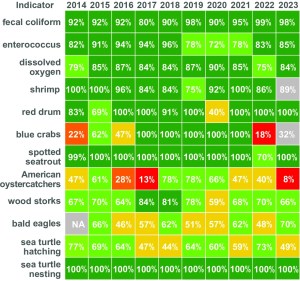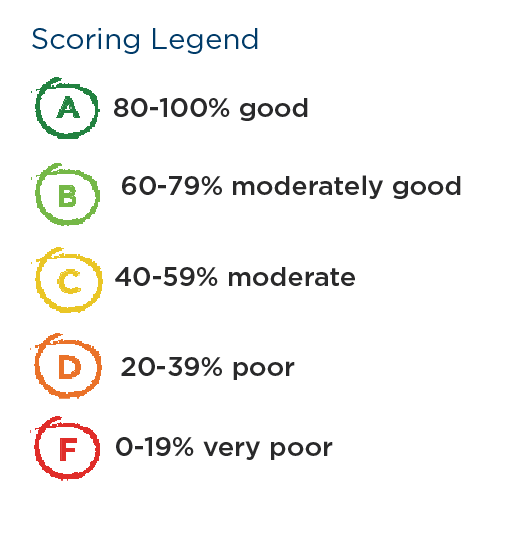Stay ahead of the curve as a political insider with deep policy analysis, daily briefings and policy-shaping tools.
Request a Demo‘Gas Is Ridiculous’: Georgians Weather Inflation with Few State Solutions

Credi: Canva
- Gas prices have soared 35% – from $2.90 to $4.49 a gallon for regular fuel – over the past year.
- Grocery prices for items like milk – 25% higher – and eggs – 43% higher -- have also spiked.
- Will Federal Reserve interest rate hikes bring relief to Georgians struggling amid inflation?
The Gist
From Atlanta to Savannah, inflation is pummeling people in Georgia. Costs have doubled recently to buy groceries or fill up the gas tank, leaving many Georgians asking what their elected leaders can do to help ease the financial pain.
What’s Happening
The perfect storm of global supply chain disruptions, heavy public spending on the Covid-19 pandemic, and oil uncertainty from the Russia-Ukraine war have shot up prices from milk and chicken to gasoline and used cars across the U.S., including Georgia.
“When the not-so-organic section is the same price or higher as the organic section, we have a major red flag here,” said Ashley Bruce, an Atlanta metro bartender with four young kids. She’s seen prices double for her home’s staples like mangos, broccoli and milk in recent months. “And the meat section?” she added. “Forget about it.”

Prices for gas and groceries like milk, bread, meat and eggs have shot up in Georgia and across the U.S. over the past year. (Credit: Brittney Phan for State Affairs)
On Wednesday, the Federal Reserve hiked interest rates higher than it has in nearly three decades, aiming to wrangle inflation levels that have caused rent, groceries and gas prices to soar faster in the Atlanta area than any other urban zone in the country, except Phoenix. As of April, prices overall in the Atlanta area were nearly 11% higher than they were a year ago.
But don’t expect a break on stiff gas and food bills anytime soon, local economists say. Inflation will likely continue taking its toll on Georgians struggling to stretch their dollars at the pump and grocery shelves for at least another year or more. And there’s little Georgia government officials can do about it.
“I think we’ve exhausted the state-level options,” said Gopinath Munisamy, head of the Department of Agricultural and Applied Economics at the University of Georgia. “In my view, the federal government has more tools than the state government on this issue.”
Grocery Stores
Kelsey Tyree, a software company owner in the Savannah area, said she’s resorted to “small-time couponing” as a tactic to cover her family’s groceries. She hops from Kroger to Publix to Dollar General, hunting for deals.
“If Dollar General has a coupon sale for detergent, that’s where I’ll get my detergent,” said Tyree. Her grocery runs have spiked from $200 every other week last September, to $300 when her newborn son arrived in January. Now, she’s shelling out $400. “It’s a whole day trip just going to different stores.”
Prices have been punishing for grocery stores in Georgia and beyond. In Atlanta, a gallon of milk has jumped 25% to $4.29 last month from $3.26 in May 2021, according to the U.S. Department of Agriculture (USDA). Eggs across the South have risen a staggering 43% to $2.60 from $1.49 over the past year.
Some foods have also gotten scarce outside Atlanta. Shavokia Bryant, a nurse who runs the Atlanta-based John-Trell Foundation, travels between Atlanta, Macon and Albany giving food to the homeless. Even though it’s more expensive, she buys whole chickens in bulk in Atlanta, makes hot meals out of them, and brings them to homeless people in Macon and Albany where bulk chicken is harder to come by.
“Nine times out of 10, Albany doesn’t have chicken cases,” Bryant said. “We’ve been blessed with the means to afford things and still move forward with our mission. But for people who cannot afford it, I feel bad for them.”

Shavokia Bryant prepares and gives food to the homeless in the Atlanta, Albany and Macon areas through the John-Trell Foundation. (Credit: Shavokia Bryant)
Residents throughout the state are wondering what more, if anything, the state can do to help?
Gov. Brian Kemp used executive powers in April to reduce limits on how much weight commercial truckers can carry and the hours they can drive – a move aimed at clearing up backlogs on trucking routes to hasten food and other goods to local stores.
Several economists interviewed by State Affairs, however, suggested the governor could temporarily suspend some amount of local sales taxes to give grocery shoppers some price relief. Charles Bullock, a University of Georgia political science professor, said a Georgia governor has not suspended sales taxes in the last 50 years. Kemp’s office did not immediately respond when asked if the governor is considering a sales-tax suspension.
Outside tax breaks, the state Department of Agriculture has not asked the USDA to relax rules on food production or distribution requirements that might help lower food costs, said agency spokesman Bo Warren. The agriculture department has recently started work on a new program to send Georgia-grown farm products directly to local food banks.
That program should help boost donations to local food pantries, churches and other groups that have seen huge demand amid the Covid-19 pandemic and high inflation, said Jon West, a vice president with the nonprofit Atlanta Community Food Bank. Atlanta-area food pantries serve around 500,000 each month, he said – up from around 300,000 before the pandemic. And those that are served are from the poor to the middle class.
“Inevitably, as food costs go up, those donations are harder to get,” West said. “Hopefully some folks step up and fill that gap, but that just doesn’t always happen.”
The U.S. House of Representatives on Thursday passed the “Lower Food and Fuel Costs Act” that would send farmers $750 million to buy equipment that would help them reduce fertilizer and fuel costs. All six of Georgia’s Democratic congress members voted in favor of the bill. All eight Republican members voted against the bill.
Gas Stations
Gas is so expensive now that Karina Figueroa, a stay-at-home mom in Dahlonega, doesn’t visit her mother in metro Atlanta twice a week anymore. It takes $50 to fill the tank in her husband’s car – and he needs every bit of it for traveling to Cobb County for his job as a construction worker, a commute that takes more than an hour each way to complete.
“There’s no point in me taking a joy ride to visit my mom when he has to use gas to [get to] work,” Figueroa said. “Gas is ridiculous.”

The graph shows the rise in the consumer price index for the metro Atlanta area from April 2019 to April 2022. (Credit: U.S. Bureau of Labor Statistics)
While Georgia’s gas prices are hovering below the $5 national average at $4.49 for regular-grade fuel, they’re still significantly higher than the $2.90 for regular fuel a year ago, according to AAA’s gas-price survey.
Tyree, the software-company president in Savannah, has used her couponing method to rack up gas discounts at stations run by Kroger, which lets customers shave off costs from pumping gas whenever they shop for groceries. Still, gas has leapt from $30 to fill up Tyree’s Subaru to now “pushing $60.”
Bruce, the Atlanta bartender, also takes advantage of the Kroger deal. She tries to fill up near her suburban home in Stockbridge, where she said gas is about 30-cents cheaper than in Atlanta. But her commutes around Atlanta, where public transit isn’t easy enough to reach where she needs to go, still pack a punch to her wallet.
“What are you going to do?” Bruce said. “You’re not going to fill your tank up? You have to pay the prices.”

Ashley Bruce is one of many Georgians juggling finances to cope with high gas and grocery prices amid inflation. (Credit: Ashley Bruce)
Amid global shipping snarls and oil disruptions in Russia, local economists say there’s little else Georgia officials can do to lower gas prices besides suspending the sales tax on gasoline, which Kemp did last month. Suspending the gas tax hacks off around 30-cents per gallon for Georgia drivers. The current suspension order is set to last until mid-July.
Electricity & Air Conditioning
With auto gas and food prices rocketing across Georgia, residents have largely been spared similar cost increases on their monthly energy bills. Georgia Power, which serves most of the state’s homes and businesses, needs approval from the state Public Service Commission (PSC) before recovering higher fuel costs with customer charges. The utility hasn’t sought that approval yet, said commission spokesman Tom Krause.
Overall, Georgia homes and businesses consuming an average 1,000 kilowatt-hours per month – roughly the national average for a typical American home – hasn’t changed much since last year, hovering around $125 between winter 2021 and winter 2022, according to PSC data.

Georgia Power has not yet asked state regulators for approval to hike customer charges to cover higher fuel costs amid inflation. (Credit: Wikimedia Commons)
Local energy providers that do not require PSC approval to change billing rates have hiked costs over the last year. Average monthly bills shot up $10 or more for some municipal and electric cooperative customers in North Georgia’s Blue Ridge, south of Atlanta in College Park, and in South Georgia’s Irwin County.
Despite reassurances from state regulators, some Georgians still wonder how much inflation is creeping into their monthly energy bills. Tyree says her bill’s gone up about $50 since summer started – from around $150 to $200. But that could just as easily be blamed on running the air conditioning more often with a newborn in the house, she acknowledged.
“It’s kind of hard to say just because Savannah’s terrible this time of year,” Tyree said. “Everybody’s electric bill is really high.”
What’s Next?
Economists are closely watching how the Federal Reserve’s interest rate hike on Wednesday will affect demand and borrowing. They expect the central bank to bump in interest rates again by September, unless inflation cools off significantly over the next month.
In the meantime, local economists tell State Affairs that Georgians should strap in for high gas and grocery prices for at least another year. Tibor Besedes, a Georgia Institute of Technology economics professor, said that means Georgians on tight budgets will need to clamp down on their personal spending.
“The best that consumers can do is try to adjust their consumption patterns,” Besedes said. “Shop for deals, perhaps shop in cheaper stores, and driving-wise, perhaps combine or condense trips.”
Alessandro Marazzi Sassoon contributed to this story.
Resources
- Georgia Food Pantries: Find your local food pantry
- Apply for SNAP benefits: Online portal
- Georgia Attorney General’s Office: Report price gouging
Join The Conversation
What else do you want to know about inflation and the state government in Georgia? Share your thoughts/tips by emailing [email protected].
Read State Affairs' coverage on inflation:
Read this story for free.
Create AccountRead this story for free
By submitting your information, you agree to the Terms of Service and acknowledge our Privacy Policy.
Weekend Read: Motivated by deep commitment to change, senator from Cataula promotes 369 bills
Shortly after the 2024 legislative session ended in the wee hours of March 29, state Sen. Randy Robertson began working on legislation he plans to introduce during next year’s legislative session, which starts in January 2025.
“I easily spend eight or nine months researching, working through, sitting down with attorneys making sure what I’m doing is constitutional,” the third-term Republican from Cataula told State Affairs. “[I’m] reaching out to subject matter experts to make sure that we are addressing a problem and we are addressing a problem with the right solutions and we’re not creating an additional problem.”
Raised by a single mom, the retired law enforcement officer was surprised to learn that his name was attached to 369 bills, the most introduced in the Senate during the 2024 legislative session.
Robertson said his upbringing and career in law enforcement has helped him focus on the types of bills and decisions he makes whether in the Senate chamber or on the nine committees on which he serves.
His middle name might be “over achiever.”
Robertson is vice-chair of the Senate Public Safety committee and also serves on the appropriations, children and families, ethics and government oversight committees. Last fall, Robertson took on the duties of heading the Senate’s Fulton County Jail subcommittee which is looking into problems at the Atlanta facility where 13 inmates have died in the last year.
In addition to his committee work, Robertson is the majority whip in the Senate, the fourth-highest ranking member of Senate leadership behind the president pro tem, Majority Leader and lieutenant governor.
Robertson spoke with State Affairs about the motivation behind the legislation he has sponsored. The conversation has been edited for clarity and brevity.
Q. You had a productive legislative session. You sponsored or co-sponsored a total of 369 bills during the session, making you the senator who introduced the most pieces of legislation in the Senate. What was your motivation?
A. There’s a big difference between sponsoring and co-sponsoring. Sponsoring is that individual bill that I sat down and have written up and walked through with the attorneys. The co-sponsorships a lot of times are issues I absolutely agree with and I’ll support a sponsor as they carry that bill forward, as far as debating the issue and voting for the issue and things like that.
Q. What legislative goals did you set for yourself for the 2024 session?
A. Well, to basically just finish the drill. In 2023, we passed the Prosecutorial Qualification Commission. And there’d been a change that the [Georgia] Supreme Court had asked us to make. We were able to do that with new legislation. Then, the completion of our bail bond reform legislation that we had done and just a few other things related to adoption and election integrity. Those were my primary drivers.
Q. So you got those things done?
A. We were able to get those done, for the most part. There was a bill on adoption that, for some reason, did not get through. So that’s something we’ll continue to work on. The bill would have allowed an adoptee the opportunity to get their original birth certificate once they turned 18. That was something we were hoping we’d be able to get done and sadly, we weren’t. But we’ll be back championing that legislation next session.
Q. What were you looking to accomplish with bail bond reform?
A. In the previous year, a lot of groups would come forth and they would say there are people in jail who could not afford to make bond. So we have now included in the law that nonprofits can actually establish bonding companies under Title 17 in Georgia. And since they have the opportunity to raise money, this would put them in a better position to help get some of these individuals out of jail that they’re concerned about being left there.
Q. So this will help make that a little bit easier?
A. It’s a matter of risk. Bonding companies would love to get everybody out but the problem with that is some individuals, even though they have bonds, they are at greater risk of flight, of not showing up in court, which would put the bonding companies in a precarious situation. So we tried to explain this to a lot of these groups [who felt people should still be able to get out on bond]. So we expanded the opportunities for other groups that wanted to be a part of the bail bonding community.
Q. What percentage of your bills were passed?
A.I don’t know. I don’t track that. Like I said, a lot of them I was just a co-sponsor on or I signed on with somebody else. I try not to get caught up in that. Some people worry about that. You just support good, quality legislation and understand that what doesn’t get through this year, if it’s something that is still an issue next year, then there’s always that opportunity to bring it back. The most important thing we have to do is get a balanced budget put out for the taxpayers and then those public safety issues, health care issues and things of that nature. Those are the most important things to get out there in session. Once those get out, everything after that a lot of times are just small pieces to correct particular issues.
Q. How has your career in law enforcement shaped your time in the Senate?
A. Well, my experience not only in law enforcement but working in the infrastructure of a local government that is subject to a lot of state laws, rules and regulations has had a huge influence on me.
In law enforcement, you’re out in the real world. And sadly, we have some legislators that really don’t understand what abject poverty is. They don’t understand what abuse is. They’ve never seen domestic violence up close. So I tell everybody, as human beings, it seems like the vast majority of us live in the zoo, where everything is controlled and we get fed, we get water we get really taken care of. But there’s a lot of people still trying to survive out in the jungle, on the Serengeti and in the forest where life is real. And, law enforcement is one of those careers that puts you out there in that environment to see what goes on.
I was primarily raised by a single mother — me and my two sisters. And so my mother worked two jobs. The things that we thought were hard growing up, now I realized were blessings. So now I am able to support a cross section of Georgians, whether they be Democrat, Republican, Independent or whatever. Poverty doesn’t know a political party. Crime doesn’t know a political party. So to have the experiences I’ve had, I feel it’s really benefited me in the Georgia Senate.

Q. What were you hoping to achieve for your constituents, and Georgians in general, through the types of bills that you sponsored or co-sponsored?
A. For the citizens, the one thing I really wanted to accomplish was lower taxes. With the economy the way it is and the recession moving up and down, it doesn’t seem like prices are changing at all. It seems like we’re still paying exorbitant amounts for fuel and other things. So, lowering taxes in Georgia I think was probably the biggest win.
Q. Of all the bills you introduced or co-sponsored, which were you the most proud of?
A. The Prosecutorial Qualification Commission and the bail bond reform.
Q. What was the impetus behind creating the Prosecutorial Qualification Commission?
A. We had an experience in my district with a district attorney. He came in and instead of enforcing Georgia laws and prosecuting Georgia laws, he was just going to pick and choose what he prosecuted and what he didn’t. He violated Georgia law in several ways that he chose to do that and he ended up going to prison.
The problem with that is there should have been something before that where citizens had a voice in getting that district attorney removed other than a recall, which is extremely cumbersome and very, very, very rare in Georgia.
So, just by putting this Prosecutorial Qualification Commission in place, we’re going to address those prosecutors who don’t do their job according to Georgia law. Out of the 50 to 60 prosecutors in Georgia I think we’ve had four that spoke out against it. All the rest of them realize if they’re doing their job, they never have to worry about this.

THE RANDY ROBERTSON FILES
Title: Georgia state senator representing the counties of Troup, Meriwether and Harris as well as parts of Columbus-Muskogee County.
Age: 61
Birthplace: Hamilton
Residence: Cataula
Education: Harris County school system. Columbus State University where he majored in criminal justice. The FBI National Academy and a few other specialty schools throughout his career.
Career: Served 30 years with the Muscogee County Sheriff’s Office, retiring in 2015 as a bureau commander at the rank of major.
Hobbies: He enjoys exercising. He also is an avid reader and collector of books. He estimates he has around 1,800 books.
Family: He and his wife Theresa have three children and five granddaughters. (He recently shaved his beard so that his five-year-old daughter would see his actual face for the first time in her life.)
What would you be doing if you weren’t in the Legislature: “I’d be doing research in public safety, and maybe writing a book or two about how we can make policing better, more professional, how we can avoid the occasional bad apples and reduce crime and uplift citizens all at the same time.”
Top 5 Bill Sponsors in the Georgia Senate

Sen. Randy Robertson, R-Cataula: 369 bills

Sen. John Albers, R-Roswell: 365 bills

Sen. Steve Gooch, R- Dahlonega: 361 bills

Sen. John Kennedy, R-Macon: 358 bills

Sen. Kay Kirkpatrick, R-Marietta: 349 bills
Source: LegisScan
Have questions, comments or tips? Contact Tammy Joyner on X @lvjoyner or at [email protected].
And subscribe to State Affairs so you do not miss any news you need to know.
X @StateAffairsGA
Instagram@StateAffairsGA
Facebook @StateAffairsGA
LinkedIn @StateAffairs
Spotted sea trout surged, shorebirds struggled, and the water’s safe for swimming
The Gist
Spotted sea trout flourished, sea turtles and shorebirds struggled, and blue crabs crawled their way out of trouble in ever-warming coastal waters last year. Those are a few of the findings in the Coastal Resources Division’s annual Coastal Georgia Ecosystem Report Card, released today.
What’s Happening
Every year since 2014, the Department of Natural Resources collects data on 12 indicators of coastal ecosystem health that impact humans, fisheries and wildlife and issues a report card.
Based on data collected in 2023, Georgia’s coastal ecosystem this year earned a B, which equates to a “moderately good health score” of 78%, up from last year’s score of 74%.
Click here to see the full 2023 Coastal Ecosystem Report Card.
The ecosystem indicators and scoring methods for the report card were developed with the University of Maryland Center for Environmental Science, which has helped to create other ecosystem health assessments around the country.

This year, red drum remained plentiful and spotted sea trout numbers improved, as the sea trout count in the Wassaw and Ossabaw sound systems rebounded. The report said a 2016 regulation that increased the minimum catch size limit for sea trout is helping.
Shrimp numbers improved a bit, too, just in time for their recognition as the state’s official crustacean by the Georgia Legislature this year.

According to the Department of Natural Resources, the dockside amount of wild-caught “food shrimp” brought in by commercial fisheries increased to 2.6 million pounds from 2.1 million pounds in 2023 (though the overall dockside value of Georgia shrimp decreased to $9.4 million from $11.3 million, largely due to competition from foreign suppliers of lower-priced, imported frozen shrimp).



Blue crabs got a D in the report but improved from a score of 18% last year to 32%. Warm coastal waters and increased salinity in the water could explain why crab numbers were low in the survey, but the report also noted its sample size of crab was skewed because its trawling vessel was out of commission for part of 2023. The amount of blue crab caught by commercial fisheries increased to 3.4 million pounds in 2023 from 3.1 million pounds in 2022, with a dockside value of $7 million.
Overall, the dockside value of all commercial fisheries tracked by Natural Resources in Georgia in 2023 was $19.7 million, about $2 million less than in 2022.
The lowest scorers

As was the case last year, shorebirds in general and American oystercatchers in particular were the animals that scored the lowest. Wildlife biologist Tim Keyes said big storms that hit the coast washed out and degraded the beaches and marsh islands where oystercatchers nest. Shorebirds, including wood storks, were also preyed on by raccoons, opossum, coyotes and hogs that live in remote coastal areas.
Keyes said the Coastal Resources Division is working with the Army Corps of Engineers to build new 10-foot-high sand islands and sandbars using dredged-up sediment near Cumberland Island and along the Intracoastal Waterway to give the birds a boost and a better place to roost.

Loggerhead sea turtles, a threatened species, dropped to a C grade from a B, primarily due to increased predation. Sea turtle nesting sites were plentiful once again, with 3,431 loggerhead nests located, and a 52% emergence rate for hatchlings. But many of the eggs and baby turtles were gobbled by wild hogs, raccoons, coyotes before they could make their journey to the sea, according to the Wildlife Resources Division report.
The good news

The report contains good news for humans who like to cavort in coastal waters, as the water quality index received an A, at 89%. Overall indicators show the water is generally safe to swim in and to eat local shellfish, that oxygen levels support fish and other species, and bacteria is at acceptably low levels.
Read this related story:
Have questions or comments? Contact Jill Jordan Sieder on X @journalistajill or at [email protected]
And subscribe to State Affairs so you do not miss an update.
X @StateAffairsGA
Instagram @StateAffairsGA
Facebook @StateAffairsGA
LinkedIn @StateAffairs
Democratic incumbents vie for redrawn House district seat
ATLANTA — Democratic incumbents running in south DeKalb County’s newly drawn District 90 are in a political predicament: Longtime comrades, they now find themselves pitted against each other.
Reps. Saira Draper and Becky Evans met Wednesday on the debate stage at St. John’s Lutheran Church to make the case for why voters should choose them for the newly drawn district in the upcoming May primary.
Mike St. Louis, chair of the Druid Hills Civic Association and moderator of the hourlong debate, lamented the“gratuitous” pairing of two Democratic incumbents in the same district drawn by Republicans who controlled the special legislative session on redistricting last year. The process was an effort to comply with a judge’s order to add more majority-Black districts.
House District 90, which Draper represents, will still include the part of Atlanta that is in DeKalb County, as well as six new precincts in southwest DeKalb that were in District 89, where Evans serves. Each was elected in districts that were and remain majority-Black, solid-blue districts.
No Republican or independent candidates qualified for the 2024 election for the new District 90.
Draper and Evans began and ended Wednesday’s debate acknowledging their respect for each other, and their chagrin over their political predicament, while trying to draw distinctions on their legislative records and strengths.
“This was not something that either of us asked for. It’s not something that either of us wanted,” Draper said. “And to me, it really underscores the fact that we have to get the majority in Georgia.”
Draper, a civil rights attorney serving in the House since 2023, said what makes her “the best person for the job … really boils down to democracy and diversity.” She described herself as an elections and voting rights expert who helped to “flip Georgia blue for the first time in 30 years” during the 2020 presidential election and the 2022 midterms, when she said she “led the voting rights efforts” in Georgia for President Joe Biden and U.S. Sens. Raphael Warnock and Jon Ossoff, for whom she oversaw campaign staff and thousands of volunteers.
Draper said she’s now fighting to bring Democratic majorities back to the state House and Senate, which she estimated will likely take four to six years.
In the meantime, she said she has worked to push through what legislation she can in the Republican-controlled House and cited as a small victory House Bill 1207, a bill she crafted that requires advanced proofing of ballots by candidates and election supervisors. Draper sought out five Republicans as co-signers to gain majority support for the bill, which passed in both chambers and awaits Gov. Brian Kemp’s signature.

Noting that “diversity is a central tenet to the Democratic Party,” Draper said, “as a woman of color and as an immigrant, I bring perspectives to the table that are underrepresented at the Capitol.”
Draper immigrated to the U.S. when she was 6 years old from England, where her Spanish mother and Pakistani father met. “That makes me Spakistani,” she said, eliciting laughter from the audience. “But it also makes me the only member of the Georgia General Assembly who is a member of the Hispanic caucus and the Asian American Pacific [Islander] caucus.”
Evans, a community organizer and political operative who has served in the House since 2019, emphasized her six years of experience building relationships with fellow legislators and delivering on measures to support education, the environment, gun safety and housing.
“And I’m 100% pro-choice, 100% pro-LGBTQ and 100% pro-health care expansion,” Evans said, adding she is proud of her work developing legislation to promote literacy among school children over the past two years, including writing a bill last year to create the Georgia Council on Literacy and another bill to ensure that children are screened for dyslexia and other reading challenges and that teachers are trained in evidence-based reading and writing instruction.
When her bills didn’t pass from the House to the Senate by the Crossover Day deadline in 2023, Evans said she persuaded Republican lawmakers in the Senate to adopt her legislation, which then passed. She now serves on the 30-member literacy council, which she said is working “to make sure that all of our children will have the broadest possible futures and that they can all learn how to read.”
Evans also said she was “proud to deliver this session $7.4 million in [federal] gun violence prevention awareness funds that will go out to community groups” and to support the passage of a bipartisan Senate bill that will give “[sales] tax breaks [on gun safety devices] where people are using their guns responsibly.” She said she also advocated for adding new funding for school security grants to the education budget, which was approved.
The candidates took similar positions on many issues, both decrying the private school voucher bill they said would drain funds from public schools, and the need for the state to better fund impoverished school districts. They described their individual efforts to curtail gun violence and promote voting rights, as well as detailed their years of experience in ground-level get-out-the-vote efforts in DeKalb County and metro Atlanta. Draper and Evans also expressed measured support of the Atlanta Public Safety Training Center, which they said is needed to train police and first responders.
Among the 40 or so people in the audience, Lora Wuennenberg, 68, a Kirkwood resident and program manager at the humanitarian nonprofit CARE, said she emerged from the debate torn between the two candidates. Noting they have similar positions on the major issues she cares about, including public education, she said Draper, her current representative, impressed her as an “an activist who can mobilize people and is willing to stand up and stand out on some of the issues that may not be getting enough attention.”
“Becky seemed more of a practical, behind-the-scenes organizer, someone who understands the bureaucracy of government and has a lot of established contacts,” Wuennenberg said, noting Evans has worked across the aisle and “found entry points” to get legislation passed. “In the Republican-controlled House, maybe she can be more effective than Saira.”
Wuennenberg said over the next few weeks she’ll follow the candidates and look to see “how Saira thinks she can mobilize support for the bread-and-butter issues that have an impact on people’s lives” in the next legislative session.
Arica Schuett, 36, a Ph.D. candidate in political science at Emory who lives in Druid Hills, said she also needs to spend more time studying the candidates.

She said Draper’s focus “on mobilizing voters and removing barriers to election participation resonated” with her, while Evans’ “experience and her ability to to work with constituencies that include Republicans is important. So getting a better understanding of how each candidate would manage their position in a really Republican Legislature is what’s important to me.”
Schuett said she plans to dive deeper into their proposed legislation and voting records. “I kind of want to look a little bit more at what they’ve done, right?”
The primary election will take place May 21.
Have questions or comments? Contact Jill Jordan Sieder on X @journalistajill or at [email protected]
And subscribe to State Affairs so you do not miss an update.
X @StateAffairsGA
Instagram @StateAffairsGA
Facebook @StateAffairsGA
LinkedIn @StateAffairs
Barbershop talks and hip-hop summits: Georgia Black legislators’ group has big plans to build coalitions, boost voter rolls
The nation’s largest gathering of Black lawmakers is slated to meet in Atlanta this summer to discuss ways to boost voter participation nationwide ahead of the upcoming fall elections.
The Aug. 2-4 conference theme is “Testing 1, 2, 3.” The meeting will be the precursor to a series of events the Georgia Legislative Black Caucus plans to hold heading into the November presidential election.
“Because we’re the largest Black caucus in the nation, we’re reaching out to all of the caucuses from across the nation,” Rep. Carl Gilliard, D-Savannah, chairman of the 74-member Georgia caucus, told State Affairs. “This is the first time that I think we’re doing a total reach-out to all of the Black caucuses. We share a lot of similarities. Whether it’s voter suppression in Georgia, the same laws are going to be tried in Tennessee and the same laws are going to be tried in Florida. We share a lot of commonalities.”
Next week, for instance, the Georgia caucus is scheduled to issue a statement supporting efforts to pass a hate crimes bill in South Carolina. The bill passed in the House but stalled in the Senate, Gilliard noted.
Over 700 Black legislators represent about 60 million Americans, according to the National Black Caucus of State Legislators. In addition to the Georgia caucus, Black caucuses exist in nearly three dozen states.
Shortly after the August convention, the Georgia Legislative Black Caucus will embark on a 14-city tour throughout Georgia to focus on “getting out the vote.”
“We’re not going to tell them who to vote for,” Gilliard said of voters. “But what is happening right now is no one is talking to the people. And if the election were held today, we all would be in trouble because no one is talking or meeting the people where they’re at.”
The tour is a continuation of various actions the Georgia Legislative Black Caucus has taken this year to align with other organizations of people of color on common causes.
In March, the caucus joined forces with the Asian American Pacific Islander and Hispanic caucuses for a tri-caucus town hall. It was the first time the three groups have aligned. The Black caucus also has “reached out to partner with the Hindus of North America population and the diaspora,” Gilliard said.
“What we’re trying to do is form a coalition to get to as many diverse groups of people as we can,” he said.
Gilliard said the lack of individual and collective involvement in communities he’s seeing concerns him. It’s a far cry from four years ago.
In 2020, the deaths of Ahmaud Arbery, an unarmed Black man murdered while jogging in Glynn County, and Breonna Taylor, a Black woman killed by Louisville, Kentucky police serving a no-knock warrant for drug suspicion, led to more than 450 protests nationwide and on three continents.
That same year, former Georgia gubernatorial candidate Stacey Abrams led an effort to increase the voter rolls for the 2020 presidential election. Fair Fight and the New Georgia Projects, two groups Abrams founded, registered more than 800,000 new voters.
That level of community and political engagement has since subsided, Gilliard said.
“People don’t know what’s going on,” Gilliard said. “No one is really talking to the people. You’ve got a presidential election. I’m talking about on both [political] sides. There are rallies and different events being held, but nobody has gone to the barbershop. No one has gone to the community centers or the neighborhoods. We’re going to be empowering those communities by going and taking those townhall meetings right where they’re at, not in a big municipality but in community centers and neighborhoods.”
The caucus also plans to hold a hip-hop summit to reach young people, many of whom are skeptical of both political parties.
“They’re forming their own opinions,” Gilliard said. “They’re saying, ‘Forget about Trump. We need to hear something different.’ That’s just their perception. That’s why I’m really quietly championing the young candidates behind the scenes who are running right now because we need young leaders.
“We have to get as many people together, but we also have to get them ready to work.”
Have questions, comments or tips? Contact Tammy Joyner on X @lvjoyner or at [email protected].
And subscribe to State Affairs so you do not miss any news you need to know.
X @StateAffairsGA
Instagram@StateAffairsGA
Facebook @StateAffairsGA
LinkedIn @StateAffairs




